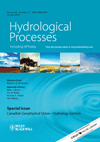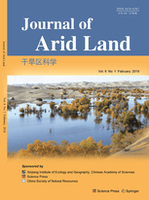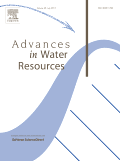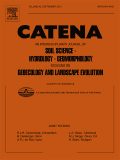
HYDROLOGICAL PROCESSES
Scope & Guideline
Bridging Science and Technology in Hydrology
Introduction
Aims and Scopes
- Hydrological Modeling and Simulation:
The journal features studies utilizing various modeling techniques, including physically-based models, machine learning, and hybrid approaches, to simulate hydrological processes and predict water dynamics across different landscapes. - Ecohydrology and Water-Ecosystem Interactions:
Research that explores the interactions between hydrology and ecosystems, emphasizing the impact of vegetation, land use changes, and climate variability on hydrological responses and water quality. - Groundwater-Surface Water Interactions:
Papers often investigate the connectivity between groundwater and surface water systems, including the effects of anthropogenic actions, such as irrigation and urbanization, on these interactions. - Drought and Flood Dynamics:
The journal covers research on the mechanisms, impacts, and management of hydrological extremes, including drought propagation and flood generation, particularly in relation to climate change. - Hydrological Responses to Land Use Change:
Studies that assess how changes in land use, such as afforestation, urbanization, and agricultural practices, influence hydrological processes and water quality outcomes. - Hydrological Tracers and Isotope Studies:
The application of isotopic and geochemical tracers to understand water sources, flow paths, and hydrological processes within different catchment areas.
Trending and Emerging
- Climate Change Impacts on Hydrology:
There is a growing emphasis on understanding how climate change affects hydrological processes, including shifts in precipitation patterns, snowmelt timing, and the hydrological response of ecosystems. - Application of Machine Learning and AI:
The integration of machine learning techniques for hydrological modeling and predictions is on the rise, showcasing the journal's commitment to incorporating advanced data analytics and computational methods. - Hydrological Resilience and Adaptation Strategies:
Research focusing on resilience strategies for hydrological systems in the face of climate variability and anthropogenic pressures is increasingly prevalent, reflecting a proactive approach to water management. - Interdisciplinary Approaches:
There is a notable trend towards interdisciplinary research that combines hydrology with ecology, sociology, and economics, aiming to address complex water-related issues holistically. - Urban Hydrology and Green Infrastructure:
Emerging themes include the study of urban hydrology, particularly the role of green infrastructure in managing stormwater and enhancing water quality within urban settings. - Hydrological Connectivity and Fluxes:
Research exploring hydrological connectivity across landscapes, including the dynamics of surface and subsurface flow and their implications for water quality and ecosystem health, is gaining traction.
Declining or Waning
- Traditional Hydrology Methods:
There is a noticeable decline in papers focusing solely on traditional hydrological methods without incorporating modern technologies or interdisciplinary approaches. The journal increasingly favors innovative techniques that integrate data science and modeling. - Localized Case Studies:
Research that focuses on highly localized case studies without broader implications or comparative analyses is becoming less frequent. The journal is shifting towards studies that can provide insights applicable to wider contexts. - Static Water Quality Assessments:
There is a waning interest in static assessments of water quality that do not consider dynamic hydrological processes. Studies that fail to link hydrological changes with water quality outcomes are less represented. - Single-Factor Studies:
Research that examines single factors in isolation, such as the impact of a single land use change or climatic event, is declining in favor of more comprehensive studies that consider multiple interacting factors.
Similar Journals

Journal of Hydrology and Hydromechanics
Pioneering insights into fluid flow and water systems.Journal of Hydrology and Hydromechanics, published by SCIENDO, is a prominent open access journal that has been disseminating crucial research findings in the fields of fluid flow, mechanical engineering, and water science since its inception in 1973. With its open access model established in 2009, the journal ensures that innovative research is available to a global audience, enhancing the visibility and impact of studies related to hydrological systems and their applications. The journal holds a commendable position within the academic community, reflected in its category quartiles, achieving Q2 rankings in 2023 across key areas such as Fluid Flow and Transfer Processes, Mechanical Engineering, and Water Science and Technology. Its Scopus rankings further highlight its relevance, placing it among the top journals in its categories. The Journal of Hydrology and Hydromechanics not only serves as a vital resource for researchers and professionals aiming to advance hydrological knowledge but also provides students with a wealth of information to better understand the complexities of water dynamics and associated engineering challenges.

Journal of Arid Land
Unveiling the science of survival in extreme climates.Journal of Arid Land, published by SPRINGER HEIDELBERG, is a pivotal platform dedicated to advancing knowledge in the fields of Earth-Surface Processes, Management, Monitoring, Policy and Law, and Water Science and Technology. With an ISSN of 1674-6767 and an E-ISSN of 2194-7783, this journal stands out as a prominent source of scholarly research focusing on the unique challenges and opportunities of arid and semi-arid environments, particularly relevant in the context of global climate change. As of 2023, it holds a commendable Q2 ranking in several critical categories, underscoring its impact in environmental science and related disciplines. The journal, which has been in publication since 2009 and is set to continue through 2024, provides unrestricted access to high-quality research that sheds light on sustainable practices and effective policies. With its focus on arid lands, the Journal of Arid Land plays an essential role in fostering interdisciplinary dialogue among researchers, practitioners, and policymakers striving to address the pressing issues faced by these ecosystems.

Hydrology
Unlocking insights for effective water management.Hydrology, published by MDPI, is a prominent open-access journal dedicated to advancing the field of hydrological science. Since its establishment in 2014, the journal has garnered a reputation for excellence, reflected in its classification within the Q2 quartile for 2023 across multiple categories including Earth-Surface Processes, Oceanography, Water Science and Technology, and Waste Management and Disposal. Based in Switzerland, Hydrology provides a vital platform for scholars and practitioners to disseminate research findings, promote innovative methodologies, and foster discussions on current trends affecting water resources and management globally. The journal is easily accessible online and aims to significantly contribute to the understanding of hydrological processes, offering insights that are pivotal for addressing contemporary environmental challenges. With Scopus rankings showcasing its growing influence, Hydrology is a crucial resource for researchers, students, and professionals committed to water science and sustainable practices.

Earth Systems and Environment
Integrating Perspectives to Shape a Greener TomorrowEarth Systems and Environment, published by Springer International Publishing AG, is a leading peer-reviewed journal dedicated to the multidisciplinary study of natural and anthropogenic processes that shape the Earth's systems. With an impressive impact factor and consistently ranked in the Q1 category across various fields, including Computers in Earth Sciences, Economic Geology, and Environmental Science, it stands as a premier platform for researchers and professionals seeking to address pressing environmental challenges. The journal covers a wide spectrum of topics, from geology to global change, and emphasizes innovative methodologies and interdisciplinary approaches to understand and manage Earth systems. As an essential resource for scholars and practitioners, Earth Systems and Environment commits to excellence and facilitates open dialogue on critical issues affecting our planet.

Journal of Hydrology-Regional Studies
Connecting global minds to tackle water challenges.Journal of Hydrology-Regional Studies, published by ELSEVIER in the Netherlands, stands as a leading open-access platform since 2014 for disseminating high-quality research in the fields of hydrology and water management. With an impressive impact factor and recognition as a Q1 journal in both Earth and Planetary Sciences and Water Science and Technology categories, it emphasizes regional studies that advance understanding of hydrological processes and their implications for sustainable management practices. The journal has established a significant global reach, evident from its Scopus rankings, which place it in the top percentiles within its disciplines, fostering a dynamic exchange of ideas among researchers, professionals, and students alike. By mobilizing critical insights and innovative solutions in hydrology, this journal aims to contribute to solving the pressing water-related challenges faced by our society.

LHB-Hydroscience Journal
Advancing Sustainable Solutions in HydroscienceLHB-Hydroscience Journal, published by Routledge Journals, Taylor & Francis Ltd in the United Kingdom, stands as a significant platform in the realm of Water Science and Technology. Since its inception in 2021, this open-access journal has been dedicated to disseminating high-quality research that addresses the critical challenges faced in hydroscience, aiming particularly at fostering innovative solutions for sustainable water management. With an impressive E-ISSN of 2767-8490, it offers researchers, professionals, and students the opportunity to access cutting-edge findings without any paywall, thereby promoting wider dissemination and engagement within the academic community. Although it currently holds a Q4 quartile ranking and ranks #208 out of 261 in the Environmental Science category, the journal aspires to elevate its scholarly impact through rigorous peer-reviewed articles that contribute to the field from 2021 to 2024. As recognition of its growing significance, LHB-Hydroscience Journal invites contributions that explore the multidimensional aspects of water science—from interdisciplinary methodologies to real-world applications—catering to an audience eager to push the boundaries of current knowledge.

Journal of Water Management Modeling
Bridging Research and Practice in Water Resource ManagementThe Journal of Water Management Modeling, published by COMPUTATIONAL HYDRAULICS INT, stands as a pivotal resource in the fields of Civil and Structural Engineering, Geography, Planning and Development, and Water Science and Technology. With an ISSN of 2292-6062, this Canadian-based journal has earned its reputation by exploring innovative modeling approaches to enhance water management, crucial in addressing today's environmental challenges. Despite its current Q3 status in Civil and Structural Engineering and Water Science categories, alongside a respectable Q2 rank in Geography, the journal is committed to advancing knowledge and fostering collaboration among researchers, practitioners, and students passionate about the sustainable management of water resources. The journal operates on an open-access model, ensuring research is readily available to a broad audience, and has converged its editorial focus from 2018 to 2024, continuously adapting to emerging trends and technologies within the discipline. As a part of the global conversation regarding effective water management, it plays a vital role in informing policies and practices that impact communities and ecosystems alike.

ADVANCES IN WATER RESOURCES
Leading the way in hydrology and environmental stewardship.ADVANCES IN WATER RESOURCES is a premier peer-reviewed journal published by Elsevier Science Ltd, dedicated to advancing the field of water science and technology since its inception in 1977. With an impressive Q1 ranking in the field, this journal provides a vital platform for researchers, professionals, and students to disseminate cutting-edge research that addresses critical issues related to water resources management, hydrology, and environmental sustainability. The journal offers a comprehensive collection of articles that explore innovative methodologies, policy implications, and case studies that shape the future of water resource management. Although it does not provide open access, its impactful contributions are recognized globally, making it an essential resource for anyone engaged in water science. The journal continues to publish relevant research while looking forward to bridging the gap between theoretical insights and practical applications up until 2024.

CATENA
Pioneering Research for a Sustainable PlanetCATENA is a distinguished academic journal published by Elsevier, focusing on the critical field of Earth-Surface Processes. With a solid foundation established in 1973, CATENA has continuously evolved, offering a platform for high-impact research and groundbreaking discoveries in geosciences. The journal holds an impressive Scopus rank of #8 out of 179 in its category, placing it in the top 5% of its field, which underscores its importance and influence among researchers and practitioners alike. While CATENA does not operate under an open access model, its commitment to disseminating essential findings is evident in its rigorous peer-review process and inclusion of diverse studies. Located in the Netherlands, CATENA not only serves as an essential resource for professionals and students but also contributes valuable insights that help address global environmental challenges.

Earth Interactions
Unveiling the Interconnectedness of Earth’s SystemsEarth Interactions is a prominent journal that serves as a critical platform for interdisciplinary research in the field of Earth and Planetary Sciences. Published by the American Meteorological Society, this journal has established itself as a key resource for scholars, researchers, and professionals dedicated to understanding Earth's complex systems and their interactions. With an impressive Q1 ranking in the category of Earth and Planetary Sciences for 2023, it reflects a commitment to high-quality scholarship and impactful contributions to the field. The journal, with its dedicated coverage from 2004 to 2024, encompasses a wide array of topics, providing comprehensive insights into geological, atmospheric, and environmental phenomena. Although it operates under a non-open access model, its significance is underscored by its placement in the top percentile of Scopus rankings (Rank #89/195), making it an exciting resource for those pursuing advanced studies and applications related to Earth's systems.